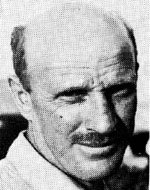Shturman, Chaim
Son of Menucha and Avraham Moshe. He was born on the 2nd of Tevet (2.1.1892) in the town of Chavrone in the Ukraine, and in 1906 his family immigrated to Eretz Israel and settled in Jaffa, where he studied for a while at the Herzliya Gymnasium. He joined the “Hashomer” organization in Hadera, where he experienced all the hardships and problems of guarding. In the wake of an encounter with Arab shepherds one day he was arrested and imprisoned. On 21.9.1921 he was with the first immigrants on the ground near Ein Harod. He knew how to establish relations of friendship and mutual respect with the Arab neighbors, and it was this quality that helped him with the purchase of the lands he had carried out on behalf of the Jewish National Fund in the Harod bloc. In the negotiations with them, he knew how to win their hearts and inspire their trust, and he also took the trouble to receive fair compensation. Shaul Avigur wrote: “Chaim was one of the purest heirs to the noble knights tradition of the guard in the period of his glory.” Yosef Payne wrote: “When I recall Chaim, I see before me a perfect human being in everything: in thought, in healthy logic and in quietness, in which he acquired his full world …” On September 14, 1938, on the way from Beit Shean to Tirat Zvi, to determine the location of the Maoz group, Chaim was killed on a mine, and two of his friends were killed. He was buried in Ein Harod. He left a wife, a son, and two daughters. His son Moshe fell in the War of Independence on the defense of the Beit She’an Valley (1948). His grandson Chaim fell in battle on the island of Green (1969) and his grandson Amir Breen fell on the banks of the Suez Canal in the War of Attrition (1970). In his memory, the Beit Shturman House, a museum and a regional institute for science and nature was established next to the Gilboa Regional Council, commemorating the three who fell during the period of the Wall and Stockade, the “Garden of the Three” In their name.
